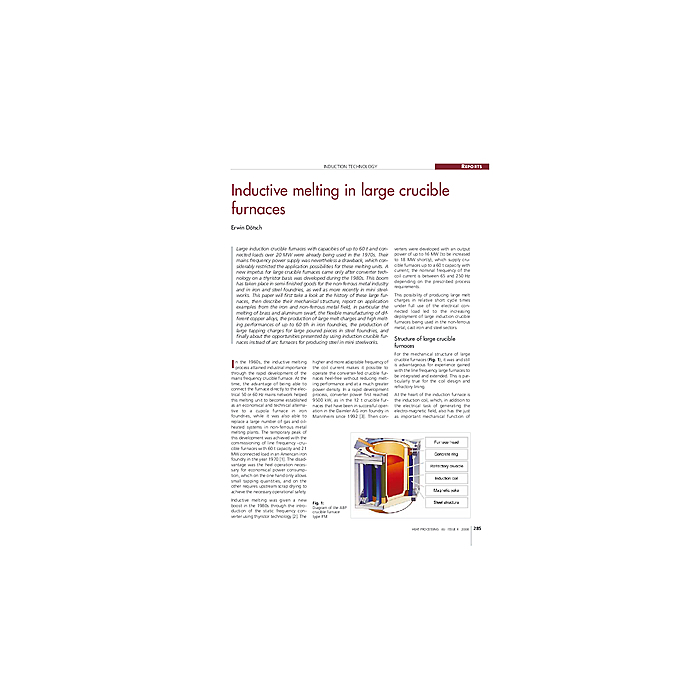Inductive melting in large crucible furnaces
4,90 €
Auf Lager
Artikelnummer
00541_2008_04_04
Large induction crucible furnaces with capacities of up to 60 t and connected loads over 20 MW were already being used in the 1970s. Their mains frequency power supply was nevertheless a drawback, which considerably restricted the application possibilities for these melting units. A new impetus for large crucible furnaces came only after converter technology on a thyristor basis was developed during the 1980s. This boom has taken place in semi-finished goods for the non-ferrous metal industry and in iron and steel foundries, as well as more recently in mini steelworks. This paper will first take a look at the history of these large furnaces, then describe their mechanical structure, report on application examples from the iron and non-ferrous metal field, in particular the melting of brass and aluminum swarf, the flexible manufacturing of different copper alloys, the production of large melt charges and high melting performances of up to 60 t/h in iron foundries, the production of large tapping charges for large poured pieces in steel foundries, and finally about the opportunities presented by using induction crucible furnaces instead of arc furnaces for producing steel in mini steelworks.
| Autoren | Erwin Dötsch |
|---|---|
| Erscheinungsdatum | 01.04.2008 |
| Format | |
| Zeitschrift | heat processing - Issue 04 2008 |
| Verlag | Vulkan-Verlag GmbH |
| Sprache | English |
| Seitenzahl | 7 |
| Titel | Inductive melting in large crucible furnaces |
| Beschreibung | Large induction crucible furnaces with capacities of up to 60 t and connected loads over 20 MW were already being used in the 1970s. Their mains frequency power supply was nevertheless a drawback, which considerably restricted the application possibilities for these melting units. A new impetus for large crucible furnaces came only after converter technology on a thyristor basis was developed during the 1980s. This boom has taken place in semi-finished goods for the non-ferrous metal industry and in iron and steel foundries, as well as more recently in mini steelworks. This paper will first take a look at the history of these large furnaces, then describe their mechanical structure, report on application examples from the iron and non-ferrous metal field, in particular the melting of brass and aluminum swarf, the flexible manufacturing of different copper alloys, the production of large melt charges and high melting performances of up to 60 t/h in iron foundries, the production of large tapping charges for large poured pieces in steel foundries, and finally about the opportunities presented by using induction crucible furnaces instead of arc furnaces for producing steel in mini steelworks. |
Eigene Bewertung schreiben


